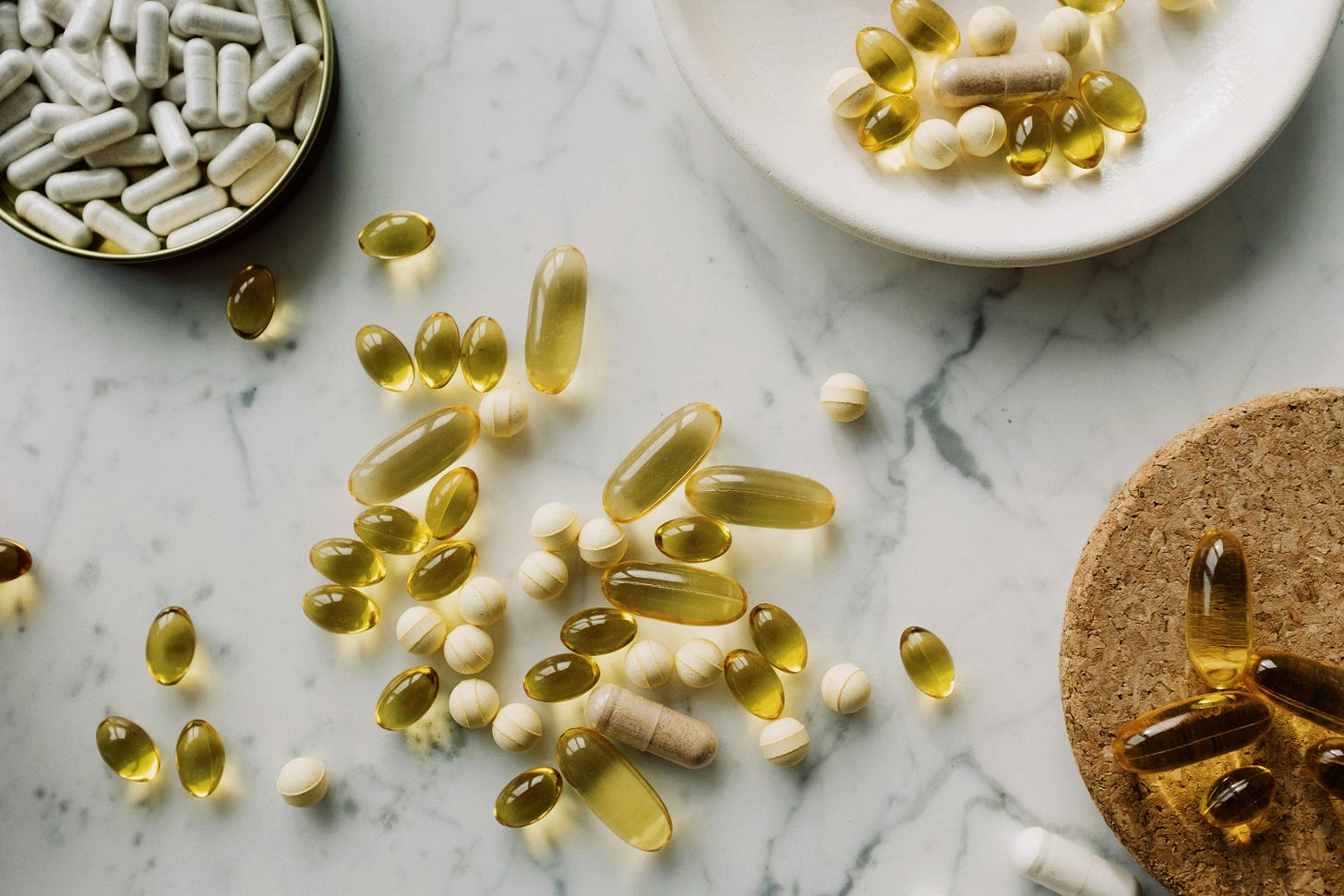The Supplement Rabbit Hole: A Simple Guide to Ending the Confusion
Are Supplements Like Creatine, Collagen, Green Powders, and Protein Powder Actually Worth It? Plus the Recipe: Rainbow Black Rice
*This newsletter is not intended to be medical advice. Supported by Mandy Murphy Carroll, RD MPH, Dr. Rosa Keller, PHD RD, Dr. Ricki Pollycove OBGYN, & Dr. Claire Packer OBGYN
Welcome to Modern Women’s Nutrition!
Empowering the busy modern woman to understand her hormone & metabolic health, and how to eat to thrive at every step of her journey—from fertility to menopause and beyond.
→ Jump to Recipe: Rainbow Black Rice
Make this recipe and remember: the most powerful supplement might just be a well-balanced meal.
Hi amazing ladies!
I hope you’re doing beautifully this week. I was recently on a flight where I met someone who was telling me about their health and wellness journey. They were obsessed with supplements, mentioned that they are currently taking about 10 pills per day and swore by the changes the supplements have made in their life.
TBH (between you and me), their lifestyle description didn’t sound all that healthy. Not to judge, but I left the conversation afraid they might be falling for all of today’s loud marketing surrounding supplements and missing out on the basics!
So, I wandered to my local health-food store, staring at shelf after shelf of colorful, enticing tubs of powders, and capsules. I was more curious than anything, to see what’s sticking out on the shelves these days. And WOW—I’m now super confused and, if I’m honest, a bit overwhelmed.
Even as a chef and a nutrition enthusiast, I get it—the world of supplements often feels like an endless maze. Creatine, collagen, green powders, protein powders, adaptogens—there’s SO much promise, but also SO much confusion! And do they even help?
If your Instagram algorithm and podcasts you listen to are anything like mine, you probably see and hear so many health and fitness creators taking various powders and potions each day. And you’re likely served a crazy number of ads from brands such as Athletic Greens, and are being bombarded with posts telling you if you’re a woman who’s not taking collagen, you’re out of your mind!?
I know I’m not alone. You’ve probably asked yourself (as I have, many times!):
"What exactly do I need? How many supplements is too many? Are any of these even working?"
So, naturally, I’ve taken the time to deep research this topic.
Today, let’s slow down, simplify, and clear the fog together, because what we put into our body shouldn’t be so overwhelming. And IF we decide to add supplements, we should feel confident in the pills we’re popping.
What Exactly Is a Supplement?

Simply put, dietary supplements are products designed to enhance your daily nutrient intake. These might include vitamins, minerals, amino acids, herbal ingredients, or enzymes. They’re meant to "supplement" (not replace!) your regular diet, especially if your nutrient needs aren't fully met through food alone. (Source: FDA)
Ideally, you’d get enough of all of this from the food you eat. And my goal with these newsletters is to get you to this point.
However, some vitamins and minerals are tough to get through just food, especially in the way today’s food is produced, as well as how it’s advertised on the shelves (in processed-food form). So, rather than having to focus on specific foods to hit a certain requirement, it can seem easier to just take a pill.
✨ Let’s hear from YOU!
Where the Heck Do You Start?
Feeling confused is normal, as supplements promise solutions for everything from clearer skin and sharper thinking, to improved digestion and better sports performance. But knowing where to start can be tricky. Especially when so many modern supplement brands rely on your health anxiety to get you to tap Checkout and give their shiny, new product a try. It can seem like a lot of BIG promises.
Start with Whole Foods, Then Consider Supplements
It's always best to get nutrients from real, whole foods first.
Here's how you can naturally support common wellness goals through your diet, and if you're still feeling a bit depleted after prioritizing a whole food diet, supplements might help. (Note: For all of the below, talk to your doctor or nutritionist first before incorporating any supplements into your diet.)
😶🌫️ Brain fog or cognitive concerns?
….(Information below is for paid subscribers only. Continue reading for ingredient suggestions & 10 recipes.)
Keep reading with a 7-day free trial
Subscribe to Modern Women's Nutrition to keep reading this post and get 7 days of free access to the full post archives.





